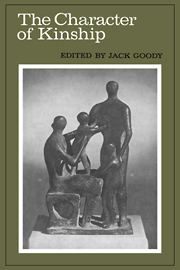Book contents
- Frontmatter
- Contents
- Dedication
- Introduction
- KINSHIP AND DESCENT
- THE NATURE OF KINSHIP
- THE NATURE OF THE FAMILY
- Kinship, Attachment Behaviour and the Primary Bond
- The Matrifocal Family
- Furies, Witches and Mothers
- MARRIAGE AND AFFINAL ROLES
- Bibliography of the Writings of Meyer Fortes
- References
- Index
Furies, Witches and Mothers
Published online by Cambridge University Press: 07 May 2010
- Frontmatter
- Contents
- Dedication
- Introduction
- KINSHIP AND DESCENT
- THE NATURE OF KINSHIP
- THE NATURE OF THE FAMILY
- Kinship, Attachment Behaviour and the Primary Bond
- The Matrifocal Family
- Furies, Witches and Mothers
- MARRIAGE AND AFFINAL ROLES
- Bibliography of the Writings of Meyer Fortes
- References
- Index
Summary
Some years ago, in the Taita District of Kenya, I overheard two men discussing proposed changes in the bridewealth laws. One said, ‘Why should I pay bridewealth at all? Why should I pay for my own children, for my own blood?’ The other answered scathingly, ‘What are you saying? Do you think that your children are not also of their mother's blood?’ Hearing their exchange I thought of the scene in Aeschylus' Oresteia when the Furies and Apollo argue the case of Orestes' murder of his mother Clytemnestra. Is he guilty of shedding kindred blood (as the Furies claim) or is the mother not really a parent (as Apollo asserts)? The East African scene might appear to have only a superficial resemblance to a great drama of ancient Greece. Yet I believe that a social anthropological examination of the Oresteia can shed some new light on it. Perhaps, also, that examination can pose some further questions for social anthropologists.
Being no classicist, I could not (if I would) refer to the vast literature on the Oresteia. Reference will instead be to only two articles. One is R. P. Winnington-Ingram's ‘Clytemnestra and the Vote of Athena’. That essay points to the subtle ways in which Aeschylus treats the relations between male and female characters. I make use of some of the author's suggestions and I try to build on his interpretation in terms of ‘the sexual antithesis’ (1948: 132).
- Type
- Chapter
- Information
- The Character of Kinship , pp. 145 - 160Publisher: Cambridge University PressPrint publication year: 1974



